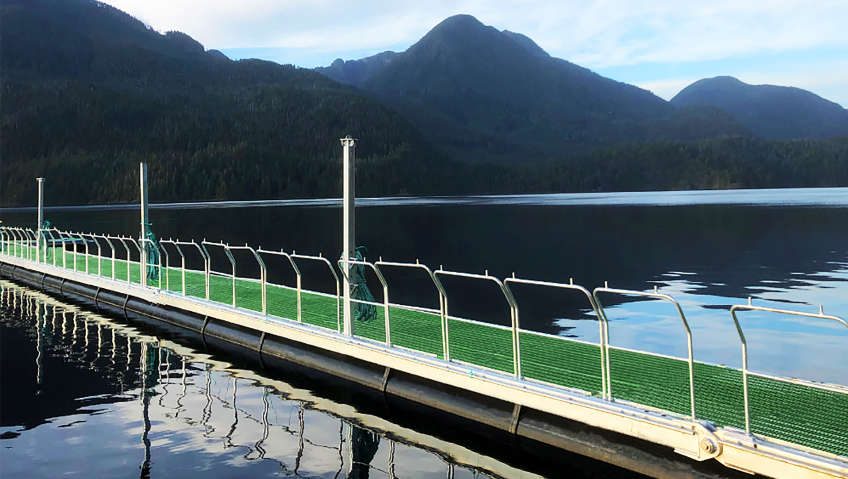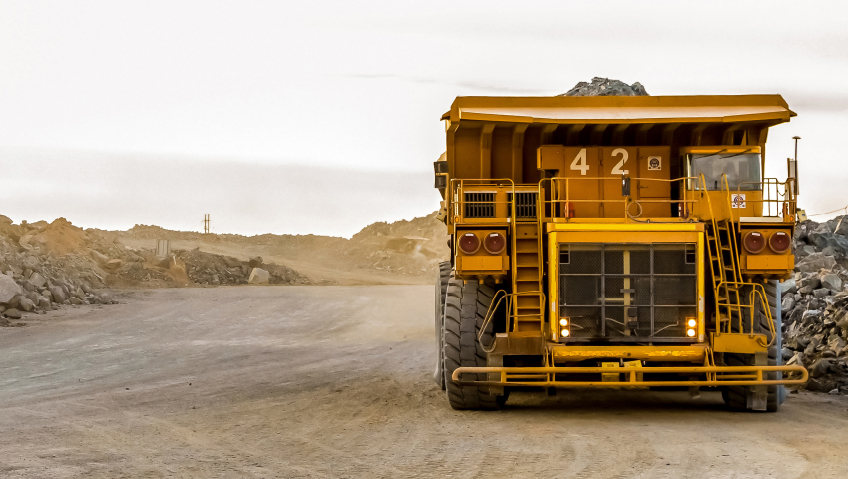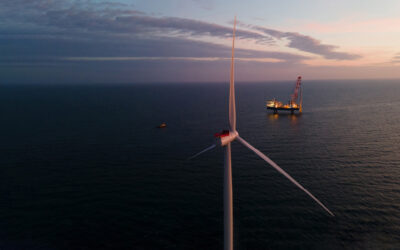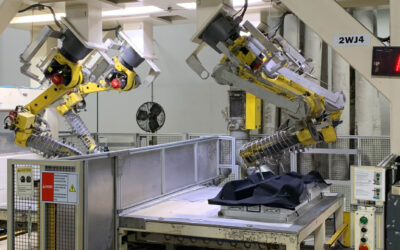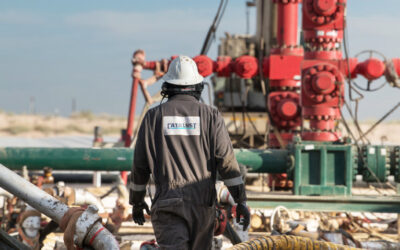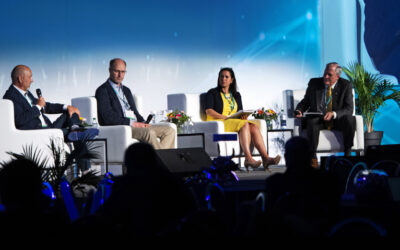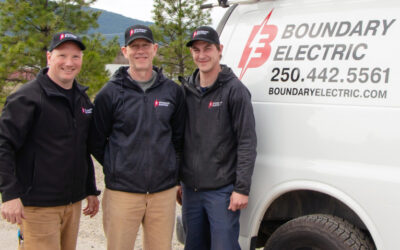Recognizing the need for better services, technical expertise, and innovative thinking in the Canadian and global aquaculture market, Mathew Clarke and partner Heather Clarke co-founded Poseidon Ocean Systems in 2015.
Coming from entrepreneurial families and owning other businesses prior to creating Poseidon, Mathew gained considerable aquaculture experience while working at Marine Harvest Canada (now Mowi Canada West), which operates salmon farms on the coast of British Columbia and Vancouver Island.
Responsible for engineering much of Mowi’s marine infrastructure including moorings, cages and barges, the couple established Poseidon with the belief there was room in the market for a unique approach to aquaculture.
“Our product development process involves significant collaboration with stakeholders and we have tried to focus our efforts in areas that were overlooked by other companies,” says Clarke of the company, which has become a worldwide recognized aquaculture solutions and technology leader focusing on infrastructure design, supply, development, engineering, and installation.
“There was a significant amount of research and development happening in other countries, and especially in Norway, but we felt there were specific aspects of aquaculture that we could improve upon,” he says.
Industry innovators
In just six years, Poseidon Ocean Systems has expanded its services and staff. Currently, with a team of 25, of whom 15 are engineers (including mechanical, mechatronics, and software specialists), the company is known for its life support systems, both aeration and oxygenation, and floating infrastructure, which saw considerable investment in Poseidon’s early days.
These included the Trident Hybrid™ Steel Cage System Developed by Poseidon, a unique aquaculture pen heralded as “the world’s most advanced aquaculture steel cage system.” In mid-February, the company announced the steel cage system’s aquaculture debut in Scotland.
Available in standard sizes ranging from 24-meter to 40-meter pens, the Trident Hybrid Steel Cage System is the most advanced of its kind in the world.
“Its forward-thinking design allows for a seamless transition to advanced technologies, such as rigid nets and floating closed containment, without the need to invest in new structures,” is how the company describes it.
The Trident hybrid steel cage was developed by Poseidon Ocean Systems to cope with high energy conditions off the coast of British Columbia. Made with High Density Polyethylene (HDPE) pipes – known for durability and long-term effectiveness – the system boasts many advantages over other products, including safety, longevity, and stability.
Certified to Norwegian standard 9415 for fish farms, it offers obstacle-free walkways, an HDPE tube flotation design that is 400 percent thicker, and is engineered to a strength of 355 MPa (megapascal). A video demonstration of the system can be seen at www.poseidonos.com/products/net-pen-constructions/.
Updating the industry
“Until the last few years, plankton and algae blooms were rare occurrences in Norway, while being common occurrences in Canada and Chile,” says Clarke. “Our Trident Hybrid cage system was born out of another opportunity; we found that the existing market offerings hadn’t had a redesign in more than 25 years.
“Farming operations had changed dramatically in that time frame, but the floating infrastructure hadn’t kept pace. Square cage systems are less common in Norway, but are used widely in Chile, as well as in Canada and Scotland.”
In North Western Scotland, Poseidon’s new design was ordered by well-known salmon producer Loch Duart through Trimara Aquaculture Services. One of Trimara’s founding directors, Stewart Hawthorn, issued a statement praising Poseidon for its exceptional work.
“We are really pleased to be bringing this new cage system design to Scotland,” he said. “Our team is proud of the trust Loch Duart is placing in us and our supplier partner Poseidon Ocean Systems. Poseidon has developed an exceptional cage system. Their advanced engineering increases staff safety, helps to ease fish care and handling, and reduces the overall cost of operations.”
With a significantly longer lifespan than existing steel-cage systems, the Trident Hybrid allows farmers to operate in more exposed areas, and can also support the transition to semi-closed containment operations.
Respecting the environment
By combining superior design ingenuity with environmentally responsible solutions, Poseidon Ocean Systems helps clients in aquaculture and other sectors boost yields while keeping the cost of operations low. Selling products and systems in Canada, Chile, Scotland and Australia, Poseidon’s industry customers include Cermaq, Greig, Mowi, Tassal, Scottish Seafarms, and Loch Duart.
“Poseidon was founded on the belief that there was room in the market for a collaborative approach,” says Clarke of the company, which works intensively with stakeholders during the product development process, and tends to focus its efforts in areas overlooked by other companies.
Offering quality aquaculture products and services including life-support systems (air and oxygen diffusion), net pens, mooring systems, underwater lighting systems, anti-predation nets, feed systems and more, Poseidon is proud of all its offerings, including the company’s Flowpressor™ system.
Flowpressor is a proprietary air compressor system designed specifically for aquaculture to produce compressed air to run aeration systems. The Flowpressor can significantly reduce fuel consumption. Unlike the standard and often inefficient mobile diesel compressors and blowers used worldwide – which can account for up to 75 percent of all fuel burned on farms annually – the Flowpressor is designed specifically for aquaculture applications.
When working with Poseidon’s IOT firmware in real-world testing, the Flowpressor can reduce diesel fuel use by nearly 60 percent. “This equates to a predicted savings of 48,000 tonnes of CO2 for the British Columbia industry alone, or the equivalent of taking over 6,200 cars off the road,” says Clarke.
“The added capabilities of artificial intelligence, machine learning, and IOT connectivity will contribute to dramatically improved fish health, as well as further reductions in emissions for aquaculture operations.”
By using less diesel fuel, Poseidon’s Flowpressor system saves on costs, and much more. Cutting the carbon footprint of modern-day salmon farms, the system also helps to prevent mass mortality events by lowering the overall operational costs of installing aeration systems, and further reducing waste.
As well as conforming to Norwegian Standard NS-9415, which allows Poseidon to certify its cage and mooring equipment as a supplier and manufacturer to the Norwegian Standard, the company holds licenses in Canada.
These include the Manufacturer’s Contractor License (MA), granted by Technical Safety BC and required to manufacture any equipment that falls under the Safety Standards Act of BC (including aeration control panels), and the Au Contractor License (Au). Granted by Technical Safety BC, this license is required for field fabrication and installation of equipment that falls under the Safety Standards Act of BC.
Facing challenges
A relatively new industry in Canada, aquaculture faces political and environmental issues. Although science confirms open-net pen operations in Canada pose minimal risk to wild fish, there is still significant pressure for producers to find alternative methods for their farming.
Fortunately, Poseidon continues to create innovative solutions. “Our Trident Hybrid Steel Cage System will allow producers to invest in traditional open-net pen operations today, and transition to semi-closed containment in the future without replacing their floating infrastructure,” says Clarke.
With global warming changing ocean conditions, harmful algae and other negative water quality events are happening more regularly, and with greater severity around the world. In British Columbia, these events have been a regular occurrence in the aquaculture industry for the last decade.
“Our Flowpressor system will reduce the operating costs and environmental impact of running aeration systems,” says Clarke, “not only for these specific events, but also on a maintenance basis to improve fish health and welfare.”
Primarily and deeply involved in aquaculture, Poseidon’s products and services also cross into other sectors. The company’s Flowpressor system generates attractive opportunities within the mining and wastewater treatment sectors, while its Trident Hybrid cage system is an excellent platform for recreational docks and marinas.
Engineers with the company have also been involved with cetacean (whale) recovery/rescue projects around the world, as well as assisting with the Province and Fisheries and Oceans Canada (DFO) during the Big Bar landslide and wild salmon recovery. Poseidon also works regularly with hatcheries and smaller operators, like shellfish farmers.
Focus on food security
Dedicated to creating state-of-the-art aquaculture solutions with Poseidon Ocean Systems that reduce costs, boost efficiencies and increase sustainability, Heather and Mathew Clarke say that the biggest compliment the company receives is that Poseidon is thoughtful.
“We pride ourselves on our collaborative approach and are genuinely interested in solving their problems,” says Mathew. “We believe that aquaculture is the path forward to a better future and we want Poseidon to be their partner in this journey.
“Food security is a major concern as our global population is expected to hit nine billion by 2050, and demand for protein is projected to at least double by then. Global demand for seafood is increasing at 8.4 percent annually, and as the capture of wild fish plateaus globally, only aquaculture can supply the projected increased demand.
“As aquaculture grows and evolves, we need to focus our efforts on innovative technologies to improve efficiencies and reduce the environmental impact of this protein production.”

